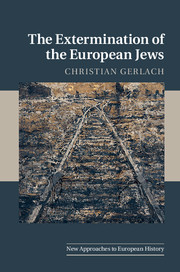Book contents
- Frontmatter
- Contents
- List of tables
- Acknowledgments
- List of abbreviations
- 1 Introduction
- Part I Persecution by Germans
- 2 Before 1933
- 3 From enforced emigration to territorial schemes: 1933–41
- 4 From mass murder to comprehensive annihilation: 1941–42
- 5 Extending mass destruction: 1942–45
- 6 Structures and agents of violence
- Part II Logics of persecution
- Part III The European dimension
- Bibliography
- Index
2 - Before 1933
from Part I - Persecution by Germans
Published online by Cambridge University Press: 05 March 2016
- Frontmatter
- Contents
- List of tables
- Acknowledgments
- List of abbreviations
- 1 Introduction
- Part I Persecution by Germans
- 2 Before 1933
- 3 From enforced emigration to territorial schemes: 1933–41
- 4 From mass murder to comprehensive annihilation: 1941–42
- 5 Extending mass destruction: 1942–45
- 6 Structures and agents of violence
- Part II Logics of persecution
- Part III The European dimension
- Bibliography
- Index
Summary
In the nineteenth century, the region that would become Germany underwent profound economic, social, political and cultural transformation. Especially from the middle of the century, industrialization set in forcefully. By 1900, Germany was one of the two greatest industrial nations – together with the USA – leading in steel, chemical, and, later, electrical industries. Around 1900, about half of all Germans lived in urban areas to which many impoverished rural dwellers had moved and where a broad middle class was emerging which, by 1900, included, increasingly, many white-collar workers. From the 1840s to the late nineteenth century, streams of Germany's rural poor emigrated, particularly to the Americas. Inside Germany, a network of large cities developed linked by a railroad system that was largely complete by 1880. Imbalances remained – the northeast, still dominated by large rural estates, contained few industrial, urban centers. Germany became a leading nation also in science, technology, and, by the early twentieth century, the arts.
By 1806, the remnants of the outdated first German empire had collapsed under the Napoleonic onslaught. Under the leadership of Prussia, the largest German state, a new German nation state was founded in 1871 – a constitutional monarchy that united smaller kingdoms and duchies, but which excluded Austria. New ministries and strong bureaucratic institutions were swiftly established. In the late nineteenth century, government interference in the economy and social life increased with the first rudimentary elements of social insurance. This insufficiently addressed the so-called ‘social question’ of the millions of urban workers living in miserable conditions who increasingly formed their own political and social organizations which threatened bourgeois-aristocratic rule. Tendencies toward a welfare state became stronger – although without ending widespread poverty – after Germany became a republic with the introduction of universal suffrage in late 1918. The monarchy was toppled by infuriated workers and soldiers who were weary of a war effort primarily placed on their shoulders that seemed to them to make less and less sense, especially given that Germany was heading toward defeat. Red flags flew over Berlin, but then the strong working-class movement split, and the radical left was defeated. The period of the Weimar Republic was characterized by economic and political instability and fierce internal conflicts between the political left and right in which the initially strong centrist parties melted away.
- Type
- Chapter
- Information
- The Extermination of the European Jews , pp. 19 - 38Publisher: Cambridge University PressPrint publication year: 2016

